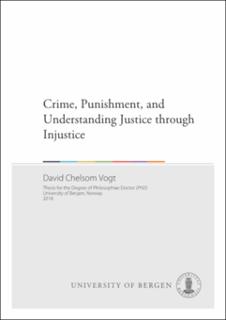Crime, Punishment, and Understanding Justice through Injustice
Doctoral thesis

View/
Date
2018-08-24Metadata
Show full item recordCollections
- Department of Philosophy [247]
Abstract
The thesis discusses the justice of state punishment in response to criminal wrongs. The introductory chapter explores the logic of the concept of justice itself, proposing that we understand justice as the function of remedying injustice. This negative approach – studying justice through injustice – allows us to critically evaluate theories of retributive justice via the conceptions of the wrong in crime that they entail, and for which punishment is perceived as a remedy. Examples of the conceptions of the wrong in crime considered in the first part of the thesis are: ‘infringement of mutual freedom’, ‘freeloading’, ‘undermining the mutual benefits of law’, ‘undeserved profit’, ‘harm to the victim’ and ‘material imbalance’. Punishment, upon each of these conceptions, is just to the extent that it remedies the particular wrong of the crime, for instance by cancelling its undeserved profits or by alleviating the harm of the victim. The first part of the thesis culminates in a prolonged discussion of what is deemed the most suitable theory of punishment in a modern democratic state, the ‘Freedom Perspective’ based on a Kantian-Hegelian framework, whereupon crime is wrong because it infringes upon mutual freedom. The second part discusses the possible injustice of punishing severely socially deprived offenders. Specifically, it considers four reasons for the justice of lowering or abstaining from punishment of this group of offenders. These reasons relate to the material, cultural and psychological factors which increase this group’s likelihood of committing crimes and of being punished. These factors are to some extent the result of unjust social structures in society. Hence, this part discusses the links between social (in)justice and criminal justice. Finally, the thesis examines the justice of an alternative way of remedying the wrong in crime: restorative justice processes between victim(s), offender(s) and other parties to the crime. The concluding remarks are devoted to the meta-issue of how to conceive of justice when facing competing, yet plausible claims of justice.